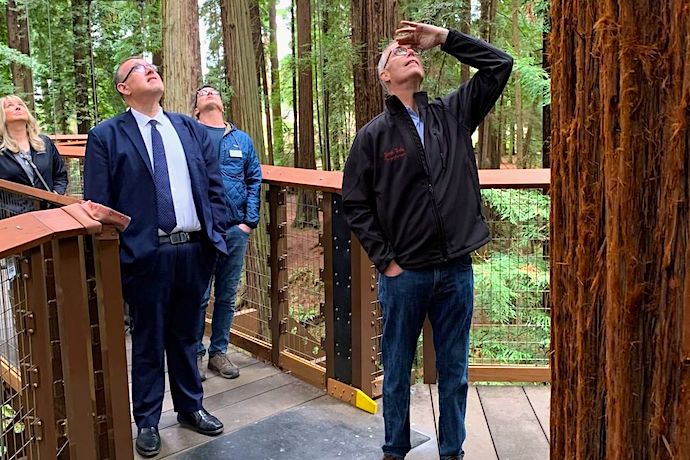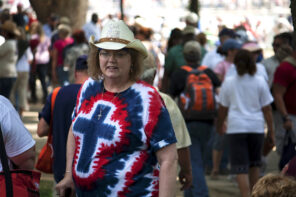Although the House of Representatives has yet to conduct any business due to a far far-right faction of Republican lawmakers denying the merely very right-wing California Representative Kevin McCarthy the speakership through 10 11 12 votes (and counting), a new Congress convened in Washington on January 3rd. As usual, Congress opened with a brazen violation of the separation of church and state, a Christian prayer by House Chaplain Margaret Kibben—a Presbyterian minister who, as constitutional lawyer and prominent secular advocate (and RD senior correspondent) Andrew Seidel highlighted on Twitter, receives a $172,500 annual salary courtesy of taxpayers for her chaplaincy.
If you ever had any doubt that the United States’ political system is designed to preserve the power of White Christians (and particularly White Christian men), the makeup of the 118th Congress should put that doubt to rest. Despite the 118th Congress being touted in the press as the most diverse ever—which, to be clear, it is—White Americans (about 60% of the population) are significantly overrepresented at about three-quarters of the new Congress.
Women’s representation is at a record 149 representatives and senators. But as Laurel Elder points out at The Conversation, at the current rate of increase it will take 118 more years for women’s representation in Congress to reach parity with men’s, and, she notes, “Currently, the U.S. ranks 73rd in the world when it comes to female representation in government.”
And then, of course, there’s the 118th Congress’s religious makeup. America’s atheists, agnostics, and nones are woefully underrepresented in the federal government, with one self-identified humanist representative and one self-identified nonreligious senator, who, to my (and not only my) great chagrin, is Arizona’s Kyrsten Sinema, the former conservative Democrat-turned-Independent who’s rightly reviled by American liberals and leftists for undermining the possibility of progressive reform at every turn.
As the Pew Research Center’s write-up on the religious makeup of the new Congress puts it, “the U.S. Congress remains largely untouched by two trends that have long marked religious life in the United States: a decades-long decline in the share of Americans who identify as Christian, and a corresponding increase in the percentage who say they have no religious affiliation.” Specifically, the new Congress’s membership is over 87% Christian, while Christians currently make up only 63% of the population. Not only are Protestants overrepresented at 56.7% of the Congress and 40% of the population, but so are Catholics at 27.7% of the Congress and 21% of the U.S. population.
It should go without saying that the vast majority of Congressional diversity is on the Democratic side of the aisle, as the Republican Party cannot substantially diversify and continue to exist in its current form. That fundamental divide—the same that’s rendered American politics dysfunctional for a long time now—is one of the factors preventing Congress from looking more like America, as the GOP is beholden to White supremacy, patriarchy, and Christian nationalism, even if its leadership is currently divided over how explicitly and aggressively to identify the party with this bigoted agenda.
The diversification of the federal government is thus hindered by the same features of American political life that allow Republicans to hold disproportionate power: the partisan gerrymandering of Congressional districts, voter suppression, and equal representation by state in the Senate, despite most of the country’s population being concentrated in the urban centers of blue states, while many red states resemble Wyoming, where pronghorn antelope outnumber humans.
When it comes to the inclusion of secular Americans in government, however, the Democratic Party can also be blamed for undue negligence toward one of its most loyal demographics. Despite some progress in recent years, Democratic leaders evidently continue to be fearful that association with a lack of religion will cost the party votes.
But so long as the party refuses to enthusiastically embrace atheists, agnostics, humanists, and all sundry nones along with progressive Christians and adherents of other religions, it simply reinforces the unfair Christian privilege that has a stranglehold on American civil society. The fear is also misplaced. Given the rapid secularization of the United States, the country is surely ready to elect more nonreligious leaders in at least some locales.
To be sure, in stark contrast to many democracies where the election of godless leaders is no big deal, American polls look bad for atheists, with only 60% of Americans reporting that they would consider voting for one. But the Democratic leadership’s entrenched habit of chasing polls (and conservative Christian voters) instead of leading with boldness and conviction can hardly be said to have worked out well for the party. By openly embracing the nonreligious demographic with voter outreach and encouragement to run for office, the Democrats could motivate the crucial, and increasingly nonreligious, youth vote while eroding the Christian privilege that enables Christian nationalists.
Younger Americans are losing faith in faith for very good reasons, and in recent cycles, they’ve been showing up to vote—and vote for Democrats—in significantly larger numbers than they have in the past. If the Democrats want to continue that momentum, the smart thing to do is to welcome the party’s nonreligious constituency with open arms.





